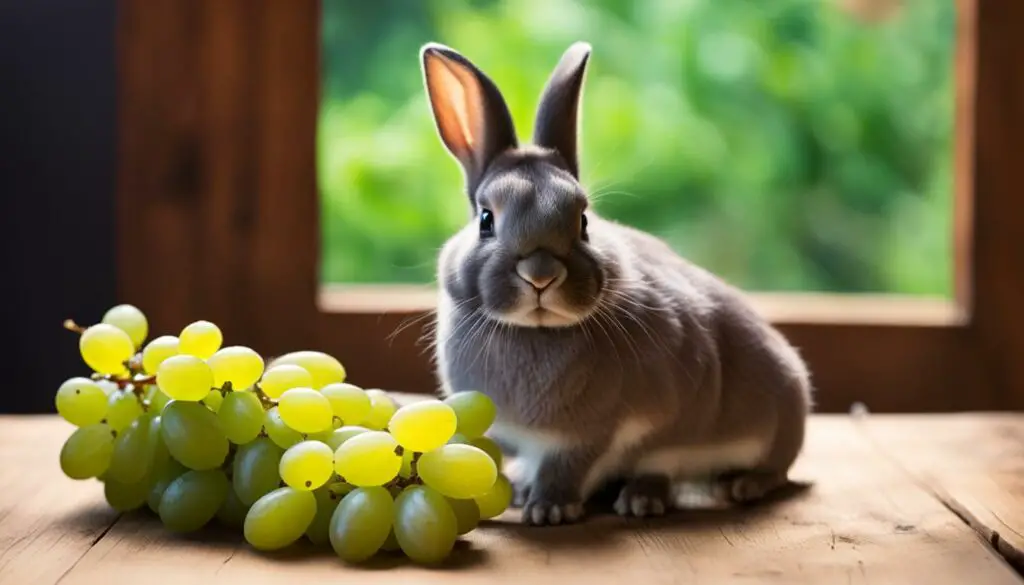As a bunny owner, you may be wondering, can rabbits eat grapes? Well, the answer is yes, but there are some important things to consider. In this detailed guide, I will provide you with all the information you need to know about feeding grapes to your rabbit.
Key Takeaways:
- Rabbits can eat grapes in moderation.
- Grapes contain vitamins, fiber, sugar, and water.
- Feeding grapes can provide antioxidants and hydration for rabbits.
- Adult rabbits can have up to 2-3 small grapes or one large grape as a serving.
- It is important to monitor your rabbit for any negative reactions and consult a veterinarian if necessary.
Nutritional Value of Grapes for Rabbits
Grapes are not only a tasty treat for humans, but they also offer some nutritional benefits to rabbits. While it’s important to feed grapes in moderation due to their high sugar content, they can provide certain vitamins and minerals that are beneficial for your bunny’s well-being. Let’s take a closer look at the nutritional value of grapes for rabbits.
One of the key vitamins found in grapes is vitamin C, which is essential for the overall health of rabbits. Vitamin C helps support their immune system, promotes healthy skin, and aids in the absorption of iron. Additionally, grapes contain vitamin A, which is important for maintaining good vision and a healthy coat.
In terms of minerals, grapes are a good source of potassium and manganese. Potassium is essential for maintaining proper nerve and muscle function in rabbits, while manganese plays a role in bone development and metabolism. These minerals are necessary for your rabbit’s overall growth and well-being.
| Nutrient | Amount per 100g of Grapes |
|---|---|
| Vitamin C | 3.2mg |
| Vitamin A | 66IU |
| Potassium | 191mg |
| Manganese | 0.071mg |
While grapes can provide some nutritional benefits to rabbits, it’s important to remember that they should be fed in moderation. Too many grapes can lead to digestive issues and weight gain, so it’s best to offer them as an occasional treat rather than a staple in your rabbit’s diet. Always monitor your rabbit’s reaction to grapes and consult your veterinarian if you have any concerns.
Are Grapes Good for Rabbits?
Grapes can be a beneficial addition to a rabbit’s diet when given in moderation. They offer several benefits that contribute to a rabbit’s overall health and well-being. Here are some of the key advantages of feeding grapes to rabbits:
- Antioxidant-rich: Grapes are packed with antioxidants, which help to neutralize harmful free radicals in a rabbit’s body. This can contribute to the prevention of chronic diseases and support a strong immune system.
- Nutrient-dense: Grapes contain essential vitamins and minerals that are important for a rabbit’s health. These include vitamin C, which supports the production of collagen and enhances the absorption of iron, and vitamin A, which promotes good vision and healthy skin.
- Hydration: Grapes have a high water content, which can help to keep rabbits hydrated, especially during hot weather or if they are not drinking enough water from their water bottle. Proper hydration is crucial for maintaining healthy digestion and preventing urinary tract problems.
When feeding grapes to rabbits, it is important to remember to offer them in moderation. Too many grapes can lead to digestive issues such as gas and diarrhea, as well as potential weight gain due to the sugar content. It is recommended to limit the intake to a few small grapes or one large grape per serving for adult rabbits.
Importance of Variety in a Rabbit’s Diet
While grapes can be a tasty and beneficial treat for rabbits, it is essential to provide a diverse range of foods in their diet. Rabbits thrive on a balanced diet that includes hay, fresh vegetables, and a small amount of fruits. This variety ensures that rabbits receive all the necessary nutrients for optimal health.
Offering a selection of different foods not only provides nutritional benefits but also helps to stimulate rabbits mentally and physically. It allows them to explore different tastes and textures, keeping mealtime interesting and enriching their overall well-being.
Caution: Moderation is Key
Although grapes can offer several benefits to rabbits, it is crucial to feed them in moderation. Overfeeding grapes or any other fruit can lead to health issues, including obesity and digestive problems. It is always best to consult with a veterinarian or a knowledgeable rabbit care professional for specific dietary recommendations for your pet rabbit.
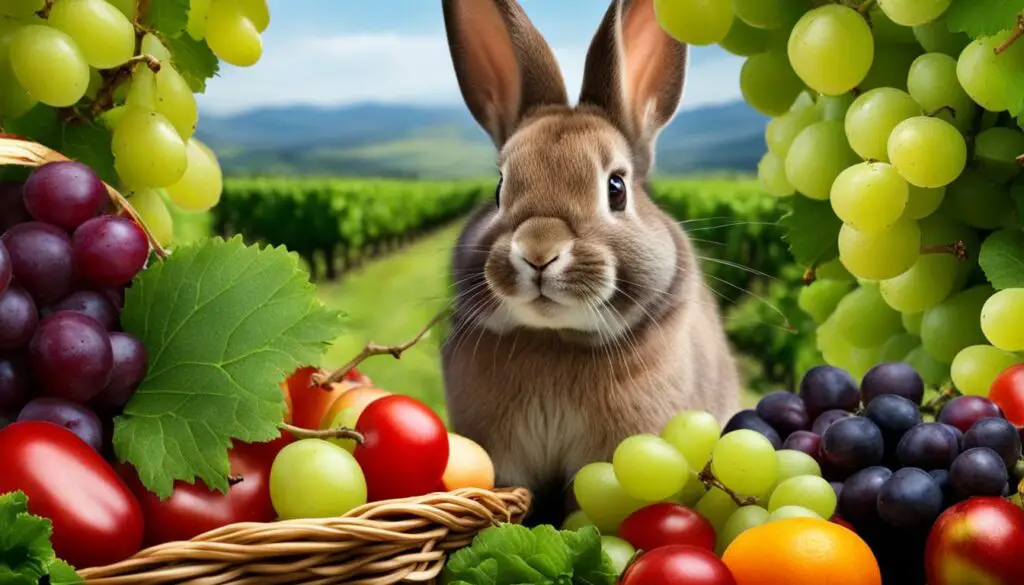
How Many Grapes Can a Rabbit Have?
When it comes to feeding grapes to rabbits, it’s important to understand the appropriate portion size. While grapes can be a tasty treat for rabbits, overfeeding can lead to health issues such as obesity and digestive problems. To ensure the well-being of your furry friend, here are some feeding guidelines for rabbits:
- Adult rabbits can have up to 2-3 small grapes or one large grape as a serving. It’s essential to keep the quantity moderate to avoid an excessive intake of sugar and water content.
- Baby rabbits, on the other hand, should not be given grapes at all. Their delicate digestive systems are not yet ready to handle the sugars and nutrients found in grapes.
- Juvenile rabbits, which are between the age of weaning and adulthood, can also be excluded from grape consumption. It’s best to introduce grapes to their diet gradually and monitor any adverse reactions.
By following these portion guidelines, you can provide your rabbit with a balanced diet while still offering them the occasional grape treat. Remember to prioritize hay and fresh vegetables as the main components of their daily meals, and use grapes as a supplement rather than a staple. Monitoring your rabbit’s overall health and consulting with a veterinarian if any concerns arise is always recommended.
| Age | Portion Size |
|---|---|
| Adult rabbits | 2-3 small grapes or 1 large grape |
| Baby rabbits | Not recommended |
| Juvenile rabbits | Exclude from grape consumption |
Remember, rabbits have unique dietary needs, and it’s crucial to provide them with a balanced and appropriate diet. While grapes can be enjoyed in moderation, a variety of fresh vegetables, high-quality hay, and a limited amount of pellets should make up the majority of your rabbit’s diet. By understanding the feeding guidelines and catering to your rabbit’s specific needs, you can ensure their health and well-being for years to come.
Why Do You Need to Be Careful?
Feeding grapes to rabbits may seem harmless, but it’s important to exercise caution due to potential hazards and digestive issues that can arise. Rabbits have a delicate digestive system that is not designed to handle certain foods, including grapes. The high sugar content in grapes can lead to obesity and other health problems if fed in excess. Additionally, rabbits may be susceptible to grape poisoning, which can cause severe complications.
Grape poisoning in rabbits occurs when the toxins in grapes affect their liver and kidneys. Symptoms of grape poisoning can include diarrhea, gas, bloating, and in severe cases, acute renal failure. Rabbits have a limited ability to process certain compounds found in grapes, making them more susceptible to these adverse effects. It is crucial to be aware of these dangers when considering grapes as part of a rabbit’s diet.
“Feeding excessive grapes can lead to grape poisoning in rabbits.”
To prevent digestive issues and grape poisoning, it is essential to feed rabbits grapes in moderation. A general guideline is to offer rabbits no more than 2-3 small grapes or one large grape as a serving. This portion size helps to minimize the risk of digestive upset and ensures that rabbits receive the nutritional benefits of grapes without compromising their health.
| Hazards of Feeding Grapes to Rabbits |
|---|
| 1. Digestive issues, including gas, bloating, and diarrhea. |
| 2. Risk of grape poisoning, which can lead to liver and kidney damage. |
| 3. Obesity due to the high sugar content of grapes. |
Are There Any Healthy Alternatives to Grapes in a Rabbit’s Diet?
While grapes can be enjoyed by rabbits in moderation, it’s always a good idea to explore other healthy options to add variety to their diet. Here are some safe and nutritious fruits that can be great alternatives to grapes:
- Apples: Rich in fiber and antioxidants, apples make a delicious and healthy treat for rabbits. Remember to remove the seeds and core before feeding them to your furry friend.
- Melons: Watermelon, cantaloupe, and honeydew melons are hydrating and low in calories. They are a perfect choice for rabbits, providing them with essential vitamins and minerals.
- Pears: Pears are a good source of fiber and vitamin C. However, make sure to remove the seeds and cut the pear into small pieces to prevent choking hazards.
- Peaches: This juicy fruit is packed with vitamins A and C, as well as dietary fiber. Be mindful to remove the pit and only give small amounts as a treat.
- Plums: Plums are a tasty way to provide rabbits with vitamins, antioxidants, and fiber. Choose ripe plums and cut them into small pieces to make them easier for your bunny to eat.
- Bananas: High in potassium and other essential nutrients, bananas can be a great occasional treat for rabbits. Feed them in moderation due to their higher sugar content.
Remember, like grapes, these fruits should be given in moderation to avoid overfeeding. The key is to provide a balanced diet that includes a variety of safe fruits, vegetables, and hay. Introduce new foods gradually and observe your rabbit’s response to ensure they are enjoying the treats without any negative side effects.
While fruits can be a healthy addition to a rabbit’s diet, it’s important to remember that the majority of their nutrition should come from hay and fresh vegetables. Fruits should only be given as occasional treats and not as a substitute for a well-balanced diet.
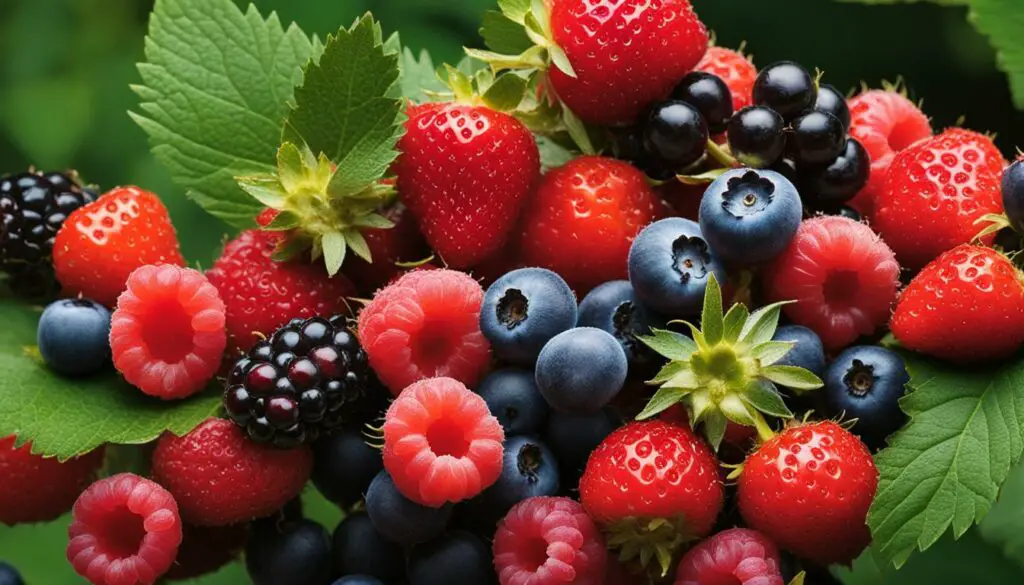
Table: A Comparison of Different Fruits for Rabbits
| Fruit | Nutritional Benefits | Serving Size |
|---|---|---|
| Apples | Rich in fiber and antioxidants | Small slices without seeds or core |
| Melons | Hydrating and low in calories | Small cubes without seeds or rind |
| Pears | Good source of fiber and vitamin C | Small pieces without seeds or core |
| Peaches | Rich in vitamins A and C | Small amounts without pit |
| Plums | Packed with vitamins, antioxidants, and fiber | Ripe and small pieces without pit |
| Bananas | High in potassium and other essential nutrients | Small slices as an occasional treat |
What to Do If Your Rabbit Shows Signs of Grape Poisoning
If your rabbit shows signs of grape poisoning, it is important to take immediate action to ensure their health and well-being. Here are some steps you can take:
- Observe the symptoms: Pay close attention to any changes in your rabbit’s behavior or physical condition. Signs of grape poisoning may include diarrhea, gastrointestinal issues, acidity, or unexplained weight gain. If you notice any of these symptoms, it is essential to act promptly.
- Contact your veterinarian: Reach out to your rabbit’s veterinarian as soon as possible. Provide them with detailed information about your rabbit’s symptoms and the possibility of grape overfeeding. The veterinarian will be able to assess the situation and provide appropriate guidance and treatment options.
- Follow veterinary instructions: Follow the instructions given by your veterinarian carefully. They may recommend specific treatments or dietary adjustments to help your rabbit recover. It is vital to adhere to their advice to ensure the best possible outcome for your furry friend.
- Monitor your rabbit: Keep a close eye on your rabbit during their recovery process. Watch for any improvements or worsening of symptoms. If there are any changes or concerns, contact your veterinarian immediately for further guidance.
“Quick action and veterinary assistance are crucial when dealing with grape poisoning in rabbits. By observing the symptoms, seeking professional advice, and closely monitoring your pet, you can help ensure their well-being and a speedy recovery.”
Table: Signs of Grape Poisoning in Rabbits
| Signs | Description |
|---|---|
| Diarrhea | Loose or watery stools |
| Gastrointestinal issues | Abdominal discomfort, bloating, or gas |
| Acidity | Increase in stomach acid production |
| Unexplained weight gain | Noticeable increase in body weight without changes in diet or exercise |
Remember, prevention is always better than cure. It is essential to feed grapes to your rabbit in moderation and follow the recommended guidelines. By doing so, you can help minimize the risk of grape poisoning and ensure your rabbit stays healthy and happy.
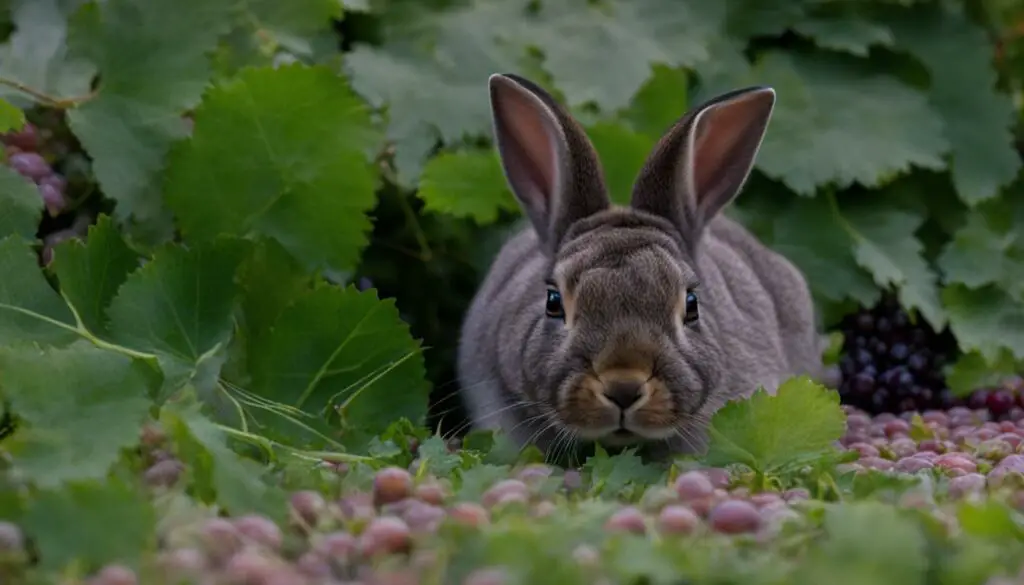
Can Rabbits Eat Grape Leaves?
Yes, rabbits can safely eat grape leaves. They are a nutritious and tasty treat that can be included in a rabbit’s diet. Grape leaves provide essential vitamins and minerals, and their fibrous nature can also help promote healthy digestion in rabbits. However, it is important to monitor the quantity of grape leaves given to rabbits to prevent excessive consumption.
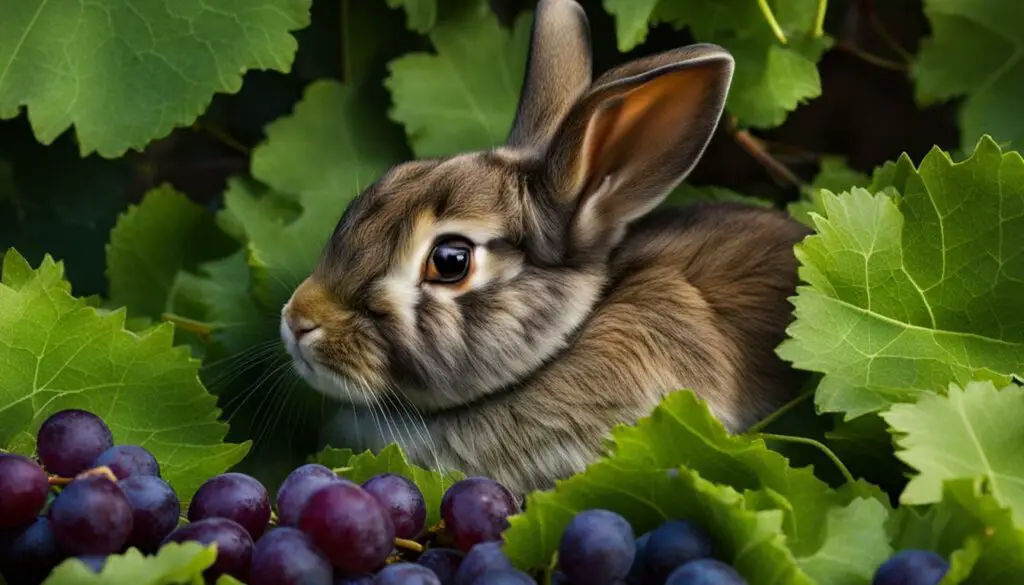
Grape leaves should be fresh and clean before feeding them to rabbits. It is recommended to wash them thoroughly to remove any dirt or potential pesticide residue. It is also advisable to avoid giving grape leaves that have been treated with pesticides or other chemicals. By providing clean and pesticide-free grape leaves, you can ensure the safety and well-being of your rabbit.
As with any new food introduced to a rabbit’s diet, it is important to start with small amounts of grape leaves and gradually increase the quantity. This will allow your rabbit’s digestive system to adjust and prevent any potential digestive upsets. If you notice any adverse reactions or changes in your rabbit’s behavior after consuming grape leaves, it is recommended to consult a veterinarian for further guidance.
Benefits of Grape Leaves for Rabbits
Grape leaves offer several benefits to rabbits. They are a source of essential nutrients, including vitamins A and C, as well as minerals like calcium and magnesium. The fiber content in grape leaves can also support digestive health and prevent issues such as gastrointestinal stasis. Additionally, the act of chewing on grape leaves can help to wear down a rabbit’s teeth, which is important for their dental well-being. Overall, incorporating grape leaves into your rabbit’s diet can provide both nutritional and enrichment benefits.
| Benefits of Grape Leaves for Rabbits |
|---|
| Source of essential vitamins and minerals |
| Promote healthy digestion |
| Offer enrichment through chewing and foraging |
| Support dental health |
Can Rabbits Eat Raisins?
Raisins are a popular dried fruit enjoyed by many people, but can rabbits safely consume them? While rabbits can eat raisins in very small quantities, it’s important to exercise caution due to their high sugar content. Raisins can be considered a treat for rabbits, rather than a regular part of their diet.
The safety of raisins for rabbits lies in their high sugar content. Rabbits have delicate digestive systems that are not designed to handle large amounts of sugar. Consuming too many raisins can lead to digestive issues such as diarrhea and gastrointestinal upset. Therefore, it’s best to offer raisins sparingly, as an occasional treat.
“Raisins can be considered a treat for rabbits, rather than a regular part of their diet.”
When offering raisins to rabbits, it’s important to remember portion control. A small piece or two of a raisin is sufficient for a rabbit’s treat. Be sure to remove any stems or seeds before feeding them to your bunny. Additionally, it’s always a good idea to consult with a veterinarian before introducing any new food into your rabbit’s diet to ensure it is safe and appropriate for their specific needs.
| Raisins for Rabbits | Benefits | Considerations |
|---|---|---|
| Can rabbits eat raisins? | – Small quantities can be enjoyed as a treat | – High sugar content can cause digestive issues |
| How many raisins can rabbits have? | – Offer a small piece or two as a treat | – Exercise portion control |
| Precautions | – Remove stems and seeds before feeding | – Consult with a veterinarian for dietary advice |
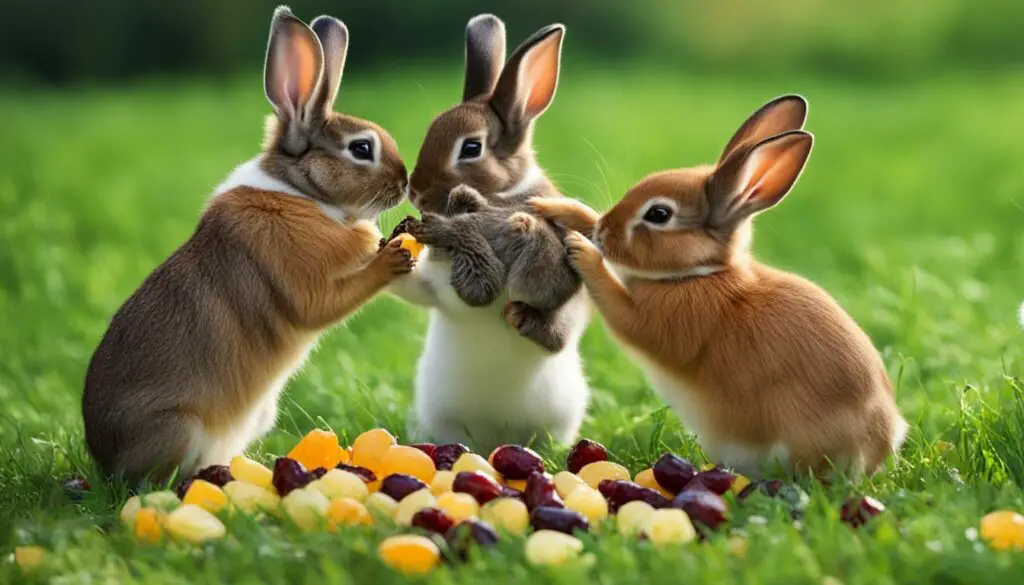
Conclusion
In conclusion, while rabbits can eat raisins in small quantities, they should be considered a treat rather than a regular part of their diet. Due to the high sugar content, it’s important to exercise caution and offer raisins sparingly. Always consult with a veterinarian for specific dietary recommendations for your rabbit.
Can Rabbits Drink Wine?
As a responsible bunny owner, it is crucial to note that rabbits should never be given alcohol, including wine. Alcohol contains toxins that rabbits cannot process effectively, and it can be harmful to their health. Even small amounts of alcohol can cause serious health issues, including liver damage, respiratory problems, and even death.
Rabbits have delicate digestive systems, and their bodies are not designed to metabolize alcohol. The consumption of alcohol can lead to a range of problems, such as dehydration, organ failure, and neurological issues. It can also cause a drop in blood sugar levels, affecting their overall well-being.
While it may be tempting to share a glass of wine with your furry friend, it is important to prioritize their health and safety. Instead, focus on providing rabbits with a balanced diet that consists of fresh hay, leafy greens, and appropriate rabbit pellets. These foods provide the necessary nutrients and hydration for your rabbit’s well-being.
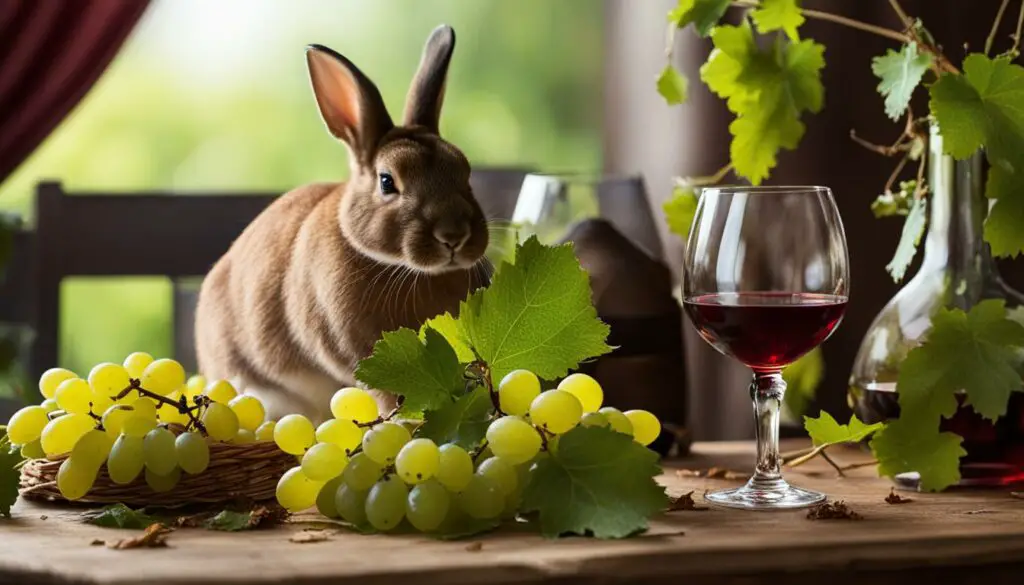
The Dangers of Alcohol for Rabbits
“Alcohol can be toxic to rabbits and should never be given to them. It can cause severe health problems and even be fatal. It’s best to avoid alcohol altogether when it comes to your furry friend’s diet.”
In conclusion, it is essential to recognize that rabbits cannot drink wine or any other form of alcohol. Their small bodies are not equipped to handle the effects of alcohol, and its consumption can result in severe health complications. To keep your rabbit healthy and happy, focus on providing a balanced diet and avoid introducing any harmful substances.
Can Baby Rabbits Eat Grapes?
When it comes to feeding grapes to baby rabbits, caution should be exercised. Baby rabbits have delicate digestive systems that are not fully developed, making them more susceptible to digestive issues. The high sugar content in grapes can cause imbalances and potential harm to their health. Therefore, it is best to avoid feeding grapes to baby rabbits altogether.
Instead, it is important to focus on providing a well-balanced diet that meets their specific nutritional needs. Baby rabbits should primarily be fed their mother’s milk or a milk replacement formula until they are weaned. As they transition to solid foods, fresh hay and water should be the main components of their diet. Introducing small amounts of fresh vegetables and a limited selection of safe fruits can also be done gradually.
Remember, it is always recommended to consult with a veterinarian who specializes in rabbit care for specific dietary advice for your baby rabbits. They will be able to guide you on suitable foods for their age, help you establish a healthy feeding routine, and address any concerns or questions you may have.
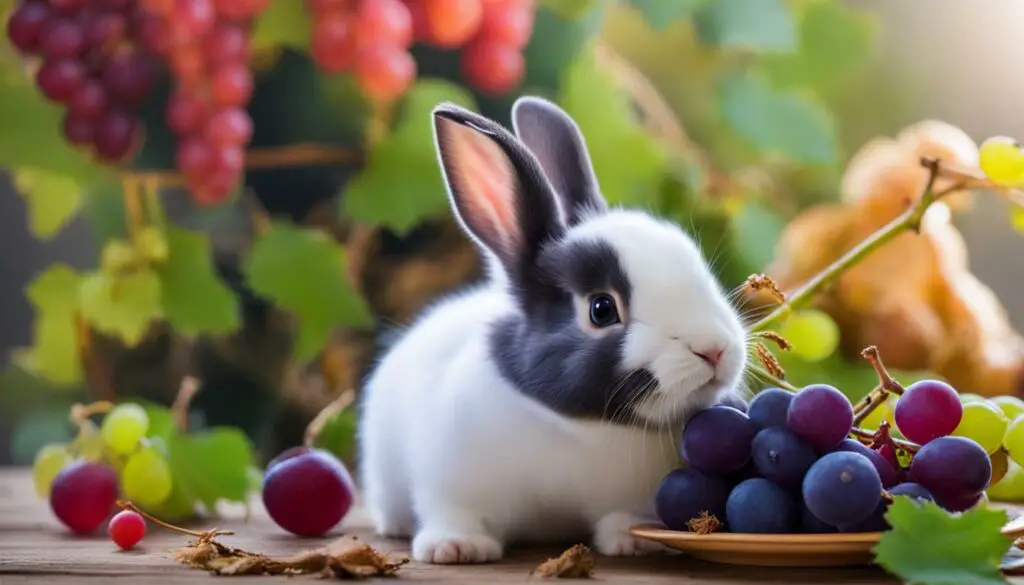
Table: Safe Foods for Baby Rabbits
| Foods | Frequency |
|---|---|
| Fresh Hay | Unlimited |
| Mother’s Milk or Milk Replacement Formula | Until the age of weaning |
| Water | Always available |
| Safe Vegetables (e.g., carrots, bell peppers, leafy greens) | Gradually introduce small amounts |
| Safe Fruits (e.g., apples, melons, pears) | Gradually introduce small amounts |
By following these guidelines and prioritizing their specific dietary needs, you can ensure the healthy growth and development of your baby rabbits. Remember, their well-being is our responsibility.
Conclusion
In conclusion, grapes can be a part of a rabbit’s diet, but it is important to exercise caution and moderation. Feeding guidelines suggest that adult rabbits can consume up to 2-3 small grapes or one large grape as a serving. It is crucial to monitor the rabbit for any negative reactions or digestive issues after consuming grapes.
While grapes can provide antioxidants, vitamins, minerals, and hydration for rabbits, it is essential to remember that they are high in sugar content. Excessive grape consumption can lead to obesity, digestive problems, and even grape poisoning in rabbits. Therefore, it is important to follow feeding guidelines and offer grapes as a treat in moderation.
For a balanced and varied diet, rabbits can also be given other fruits as alternatives to grapes. Apples, melons, pears, peaches, plums, and bananas are safe options that can provide a range of nutrients. It is important to note that fruits should still be offered in moderation and should not make up the majority of a rabbit’s diet. Leafy greens should remain the primary component of their diet.
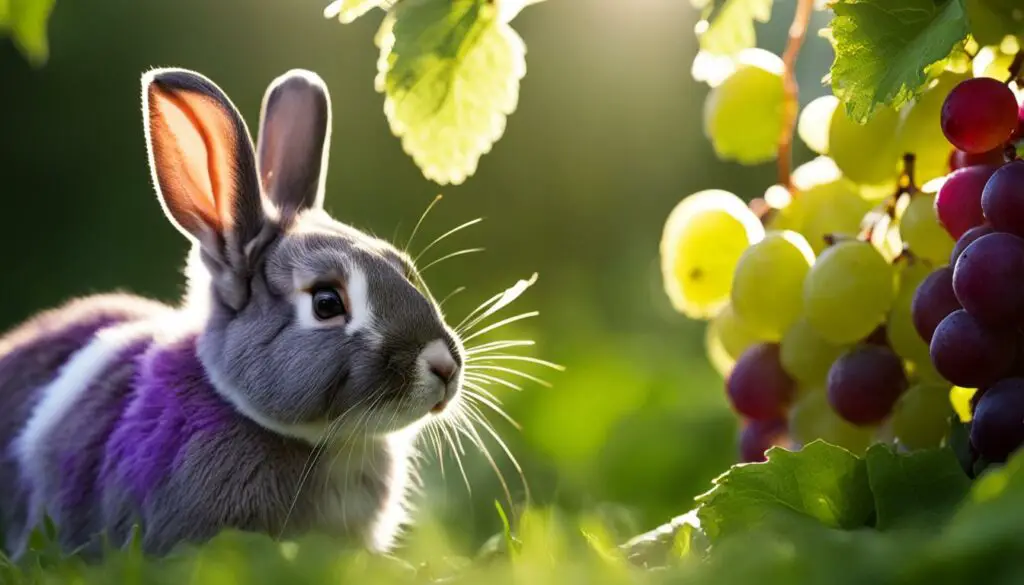
Table: Feeding Guidelines for Rabbits
| Category | Feeding Recommendations |
|---|---|
| Adult Rabbits | 2-3 small grapes or one large grape as a serving, occasionally |
| Baby Rabbits | Avoid feeding grapes to baby rabbits due to their delicate digestive systems |
| Juvenile Rabbits | Exclusion from grape consumption is recommended |
By following these feeding guidelines and considering the overall rabbit diet, owners can ensure that their furry companions receive a balanced and healthy nutrition.
Benefits of Grapes to Your Rabbit
Grapes offer a range of benefits to your rabbit’s health and well-being. Understanding the nutritional value of grapes and their hydrating properties can help you make informed decisions about incorporating them into your rabbit’s diet.
Grapes are packed with essential vitamins and minerals that can contribute to your rabbit’s overall health. They contain vitamins A and C, which support a strong immune system, and minerals such as potassium and manganese that contribute to proper bodily functions. These nutrients help keep your rabbit’s body functioning optimally and can promote a healthy coat and skin.
In addition to providing essential nutrients, grapes also offer hydration to your rabbit. Rabbits need a constant supply of fresh water to stay well-hydrated, and the high water content in grapes can contribute to their daily fluid intake. This can be particularly beneficial during hot weather or for rabbits who may be reluctant to drink enough water on their own.
Remember, while grapes can be a healthy addition to your rabbit’s diet, moderation is key. Too many grapes can lead to digestive issues or obesity. It’s important to follow feeding guidelines and offer a balanced diet that includes a variety of foods to ensure your rabbit receives all the necessary nutrients. Consult with your veterinarian for specific recommendations tailored to your rabbit’s individual needs.
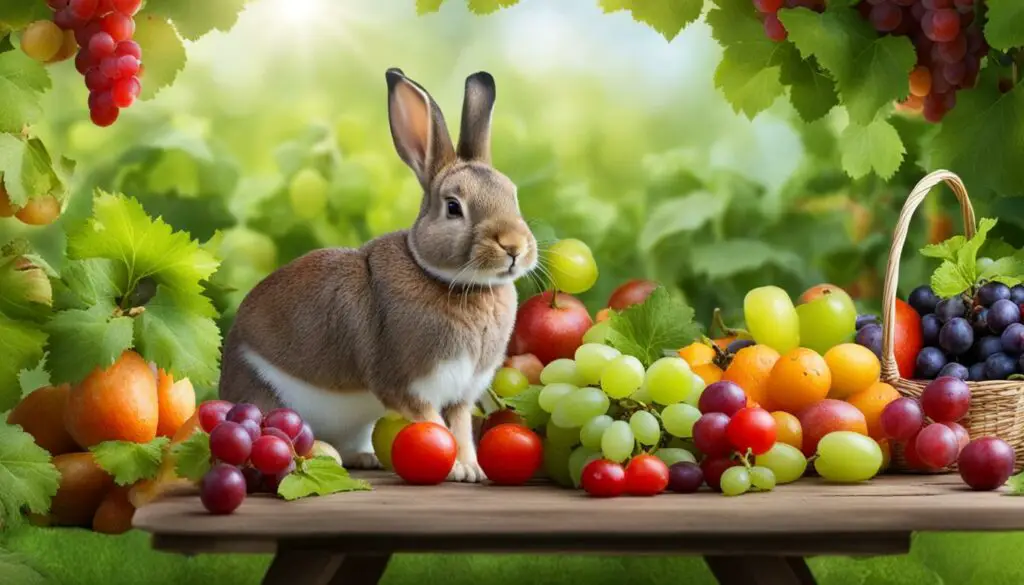
Table: Nutritional Value of Grapes for Rabbits
| Nutrient | Amount per 100g |
|---|---|
| Calories | 69 |
| Protein | 0.7g |
| Fat | 0.2g |
| Carbohydrates | 18g |
| Fiber | 0.9g |
| Potassium | 191mg |
| Vitamin A | 22μg |
| Vitamin C | 4mg |
Source: USDA National Nutrient Database
Limiting “Other” Vegetables
While leafy greens should be the main part of a rabbit’s diet, it is important to exercise caution when including other vegetables in their meals. Some vegetables, although generally safe for humans, may not be suitable for rabbits due to their high sugar or starch content. It is crucial to prioritize the well-being of our furry friends and ensure that we provide them with a balanced and appropriate diet.
Vegetables to Limit
When it comes to feeding vegetables to rabbits, certain varieties should be given sparingly or avoided altogether. Vegetables such as cauliflower and broccoli contain higher sugar levels compared to leafy greens, so they should only be offered occasionally in small quantities. Additionally, these vegetables may cause gas or bloating in some rabbits, so it is best to introduce them gradually and monitor their reaction.
Onions, leeks, and chives should be strictly avoided as they can cause potentially harmful effects on a rabbit’s health. These vegetables can lead to blood abnormalities and should never be included in their diet. It is crucial to be aware of these risks and prioritize the safety of our beloved pets.
| Veggies to Limit | Sugar Content |
|---|---|
| Cauliflower | Low to Medium |
| Broccoli | Medium to High |
| Onions | Avoid |
| Leeks | Avoid |
| Chives | Avoid |
It is important to remember that a rabbit’s digestive system is sensitive, and sudden changes in their diet can lead to gastrointestinal issues. When introducing any new vegetables, including those listed above, it is essential to do so gradually and monitor their health and well-being.
By being cautious and selective about the vegetables we offer our rabbits, we can ensure that they receive a healthy and balanced diet that supports their overall health and happiness.
Using Fruit for Treats
Feeding fruits to rabbits can be a delightful way to treat them while also strengthening the bond between you and your furry friend. Fruits like grapes and berries can be used as special rewards during training sessions or as a way to engage in interactive playtime. However, it’s important to remember that fruits should only be given to rabbits in small amounts, as their digestive systems are sensitive to high sugar content.
When offering fruits as treats, it’s essential to practice moderation. Too much fruit can lead to weight gain, digestive issues, and potential imbalances in a rabbit’s diet. It’s best to consider fruits as occasional indulgences rather than a staple in their daily meals. This way, you can ensure that your rabbit is receiving a well-rounded, balanced diet.
Remember: variety is key when it comes to a rabbit’s diet. While grapes and berries are popular fruit treats, there are other options you can explore. Apples, melons, pears, peaches, plums, and bananas are safe and healthy alternatives that can add variety to your rabbit’s snack time. Just like with grapes, these fruits should be given in moderation to avoid any potential digestive issues.
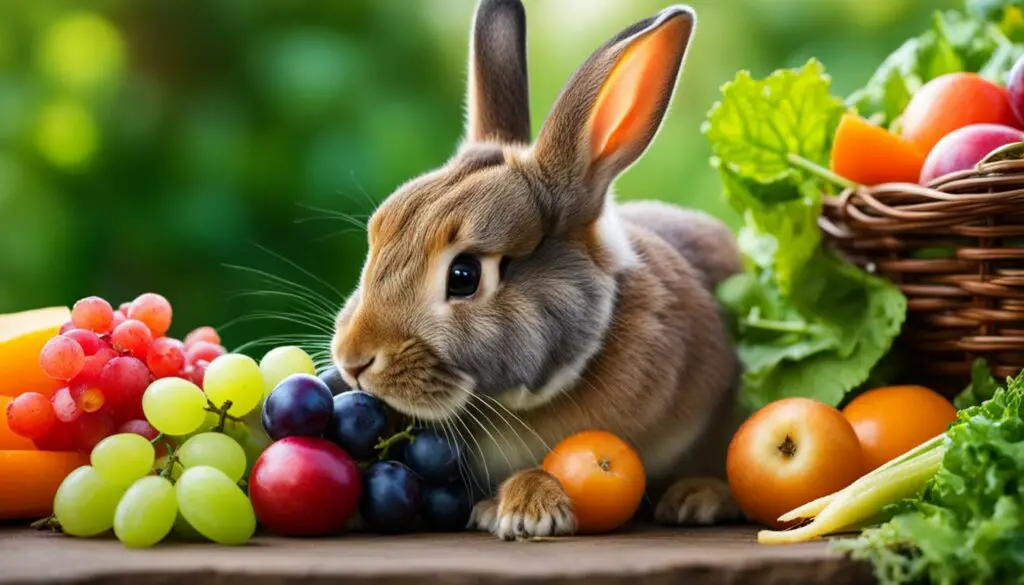
Table: Safe and Healthy Fruits for Rabbits
| Fruit | Benefits | Serving Size |
|---|---|---|
| Apples | High in fiber and vitamin C | 1-2 small slices |
| Melons | Hydrating and packed with vitamins A and C | 1-2 small cubes |
| Pears | Good source of fiber and antioxidants | 1-2 small slices |
| Peaches | Rich in vitamins A and C | 1 small slice |
| Plums | Contain antioxidants and dietary fiber | 1 small plum, pitted |
| Bananas | Provide potassium and vitamin B6 | 1-2 small slices |
By incorporating a variety of fruits into your rabbit’s diet, you can keep their taste buds satisfied while ensuring they receive essential nutrients. Just remember to introduce new fruits gradually to prevent any adverse reactions. If you notice any digestive issues or other signs of discomfort after offering fruits, consult with a veterinarian to ensure your rabbit’s health and well-being.
Washing Fruits: Ensuring Safe Consumption for Your Rabbit
As a responsible bunny owner, I understand the importance of maintaining a healthy diet for my furry friend. When it comes to feeding fruits, including grapes, to my rabbit, I take extra care to ensure their safety. One crucial step in this process is washing the fruits thoroughly.
When cleaning grapes for rabbits, I make sure to rinse them under cool running water. This helps to remove any potential pesticide residue, dirt, or other contaminants. I gently rub the surface of the grapes with my fingers to ensure all areas are clean.
I also pay attention to the quality of the grapes I feed my rabbit. I discard any grapes that appear bruised, damaged, or overripe, as these may contain harmful bacteria. By selecting fresh and clean grapes, I provide my bunny with the best possible snack option.
Why Washing Fruits is Important for Your Rabbit’s Health
Washing fruits, including grapes, before feeding them to your rabbit is crucial for their health and well-being. By removing any potential residues, you reduce the risk of exposing your bunny to harmful substances. Clean fruits can contribute to a balanced diet and help maintain your rabbit’s overall health.
Remember, your rabbit’s delicate digestive system deserves the utmost care. By taking the time to wash fruits properly, you can ensure that your bunny enjoys their treats safely while minimizing the risk of any adverse reactions.
FAQ
Can rabbits eat grapes?
Yes, rabbits can eat grapes occasionally, but in moderation.
What nutrients do grapes have for rabbits?
Grapes contain vitamins A and C, iron, magnesium, vitamin B6, potassium, and manganese.
Are grapes good for rabbits?
Grapes can provide antioxidants, essential nutrients, and hydration for rabbits.
How many grapes can a rabbit have?
Adult rabbits can have up to 2-3 small grapes or one large grape as a serving.
Why do you need to be careful with feeding grapes to rabbits?
Feeding excessive grapes can lead to grape poisoning and digestive issues in rabbits.
Are there any healthy alternatives to grapes for rabbits?
Yes, rabbits can also eat apples, melons, pears, peaches, plums, and bananas in moderation.
What should I do if my rabbit shows signs of grape poisoning?
If your rabbit shows symptoms like diarrhea or GI issues after eating grapes, consult a veterinarian for proper treatment.
Can rabbits eat grape leaves?
Yes, rabbits can safely eat grape leaves, but the quantity should be monitored.
Can rabbits eat raisins?
Rabbits can eat raisins in very small quantities, as dried fruits are high in sugar content.
Can rabbits drink wine?
No, rabbits should never be given alcohol, including wine, as it can be harmful to their health.
Can baby rabbits eat grapes?
No, baby rabbits should not be given grapes as their delicate digestive systems are not ready to handle them.

